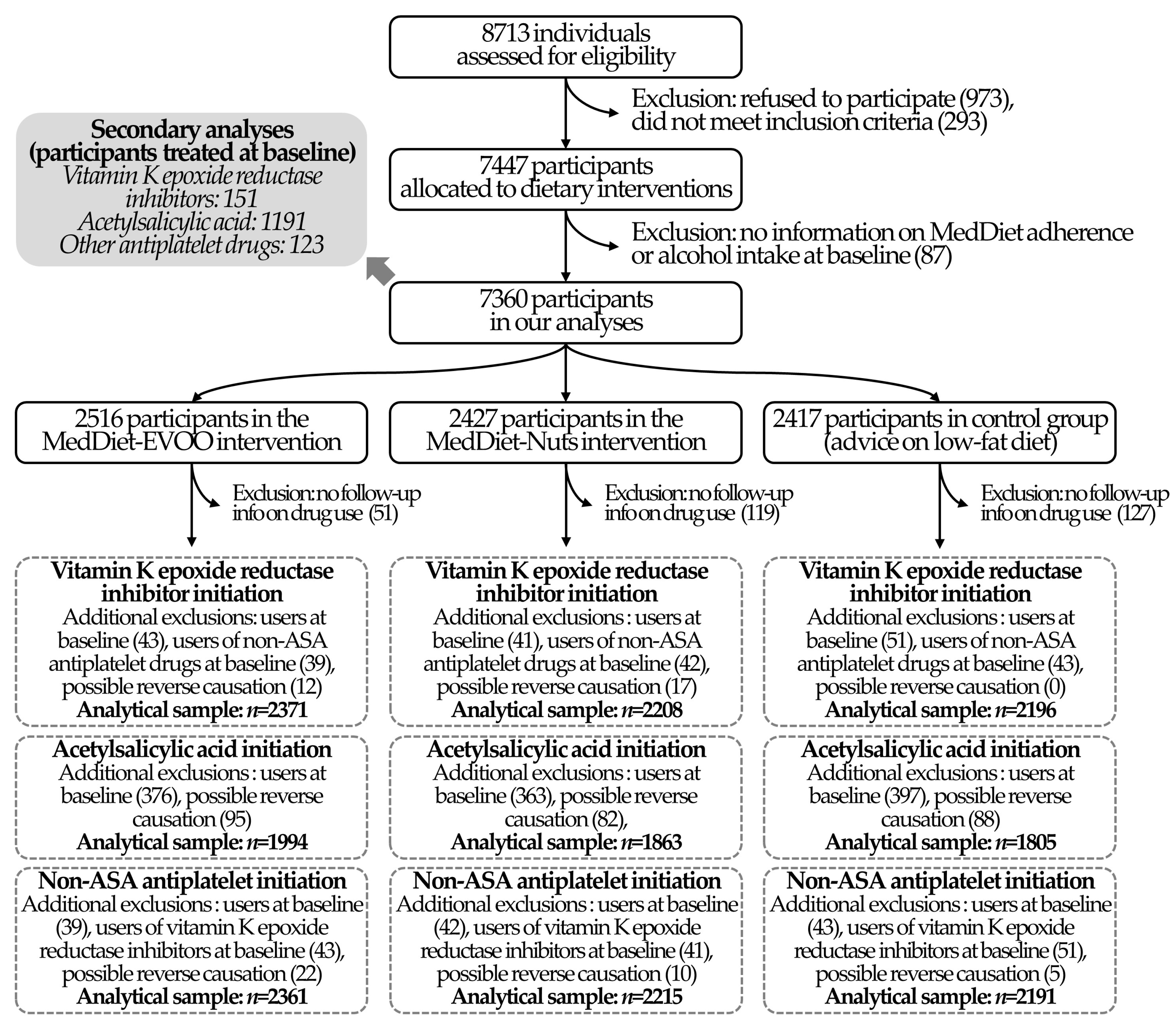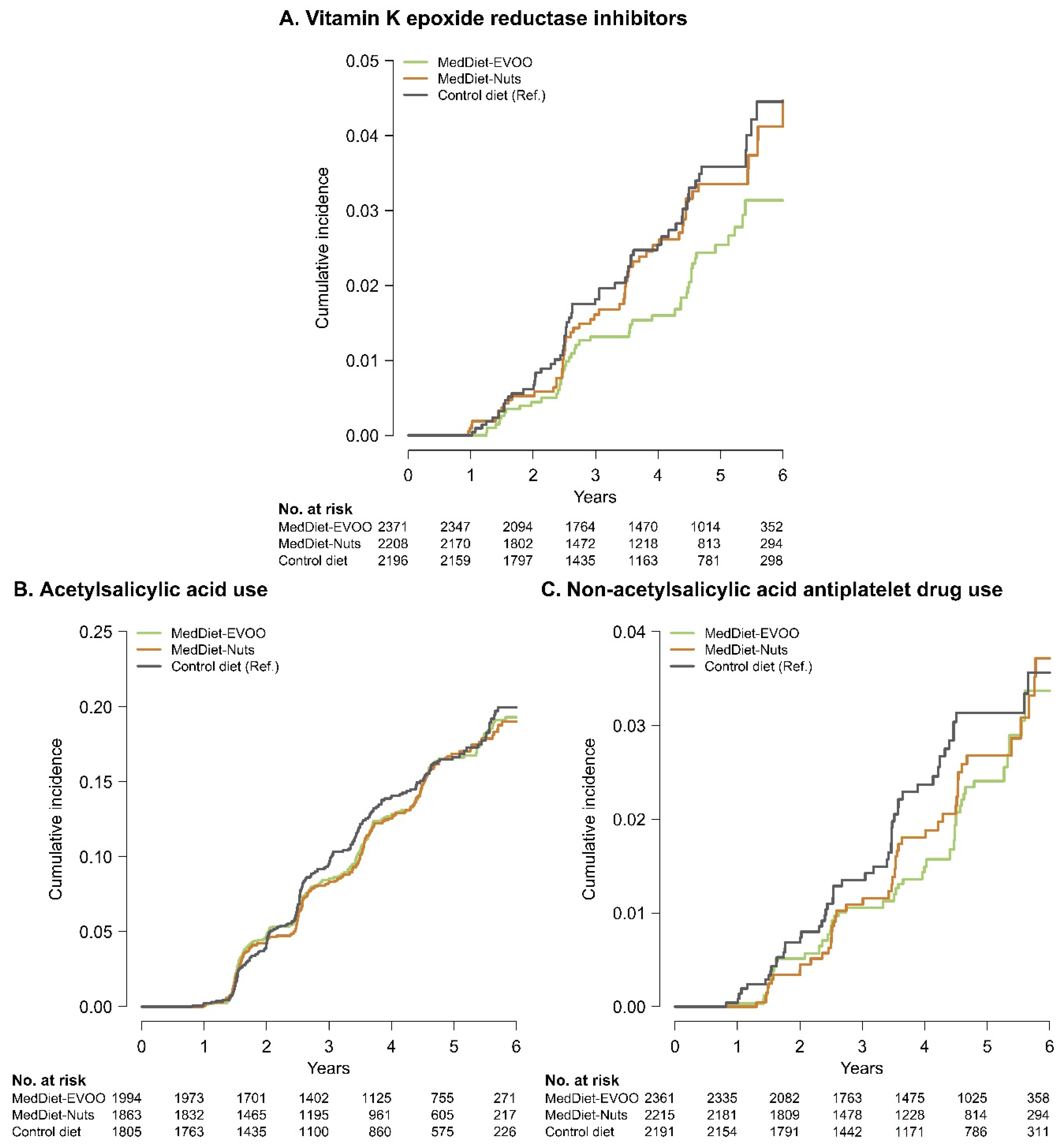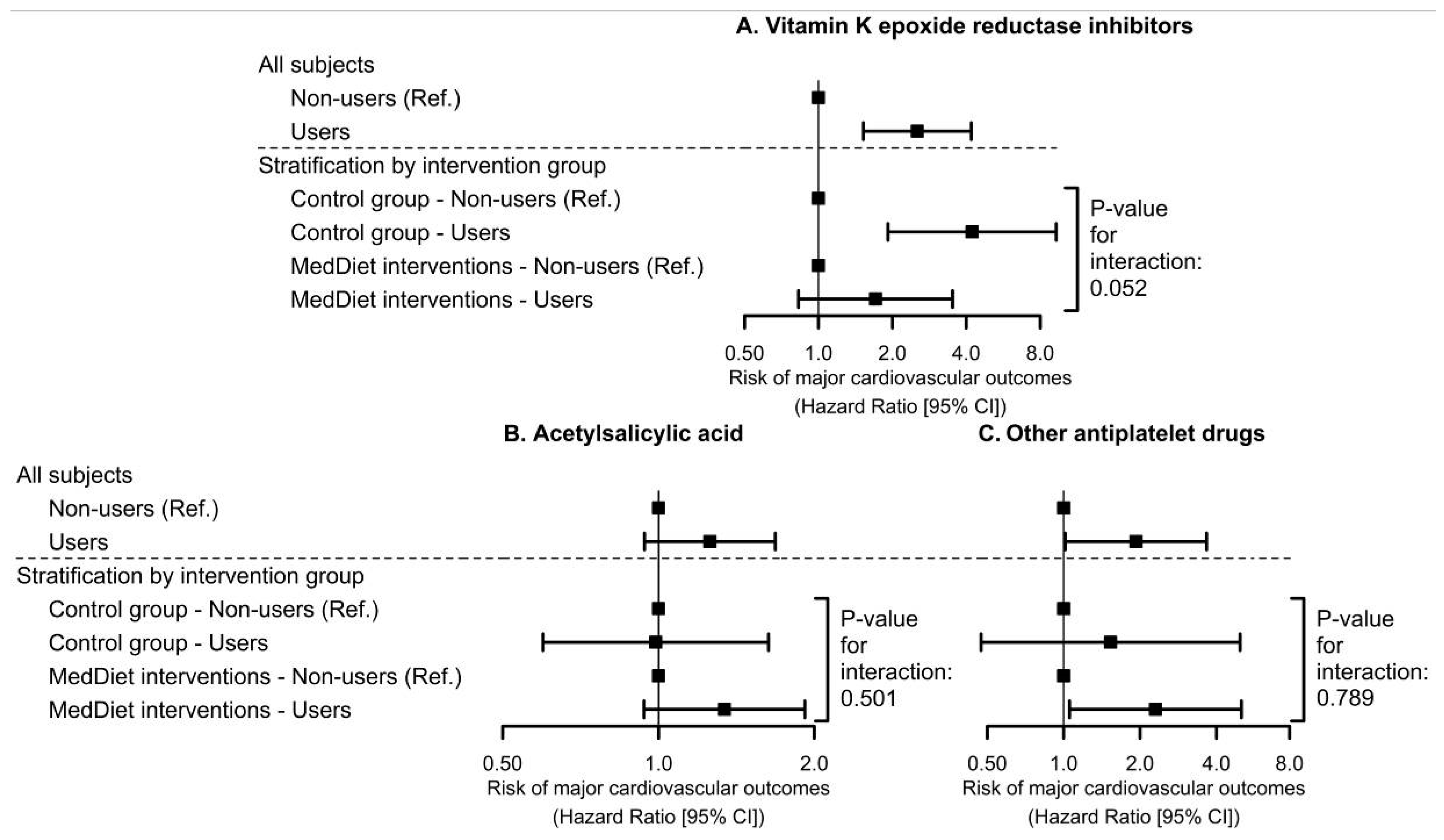Mediterranean Diet Decreases the Initiation of Use of Vitamin K Epoxide Reductase Inhibitors and Their Associated Cardiovascular Risk: A Randomized Controlled Trial
Abstract
:1. Introduction
2. Materials and Methods
2.1. Study Population
2.2. Dietary Intervention
2.3. Outcomes
2.4. Clinical and Lifestyle Vovariates
2.5. Power Analysis
2.6. Statistical Analyses
3. Results
3.1. Participants
3.2. MedDiet Effects on the Initiation of Antithrombotic Therapy
3.3. Interaction between Antithrombotic Therapy at the Baseline and MedDiet on the Incidence of Cardiovascular Events
4. Discussion
5. Conclusions
Supplementary Materials
Author Contributions
Funding
Acknowledgments
Conflicts of Interest
References
- Estruch, R.; Ros, E.; Salas-Salvadó, J.; Covas, M.-I.; Corella, D.; Arós, F.; Gómez-Gracia, E.; Ruiz-Gutiérrez, V.; Fiol, M.; Lapetra, J.; et al. Primary Prevention of Cardiovascular Disease with a Mediterranean Diet Supplemented with Extra-Virgin Olive Oil or Nuts. N. Engl. J. Med. 2018, 378, e34. [Google Scholar] [CrossRef] [PubMed]
- Martínez-González, M.A.; Gea, A.; Ruiz-Canela, M. The Mediterranean Diet and Cardiovascular Health. Circ. Res. 2019, 124, 779–798. [Google Scholar] [CrossRef] [PubMed]
- Martinez-Gonzalez, M.A.; Corella, D.; Salas-Salvado, J.; Ros, E.; Covas, M.I.; Fiol, M.; Warnberg, J.; Aros, F.; Ruiz-Gutierrez, V.; Lamuela-Raventos, R.M.; et al. Cohort Profile: Design and methods of the PREDIMED study. Int. J. Epidemiol. 2012, 41, 377–385. [Google Scholar] [CrossRef] [PubMed] [Green Version]
- Martínez-González, M.A.; Salas-Salvadó, J.; Estruch, R.; Corella, D.; Fitó, M.; Ros, E. Predimed investigators benefits of the mediterranean diet: Insights from the predimed study. Prog. Cardiovasc. Dis. 2015, 58, 50–60. [Google Scholar] [CrossRef] [Green Version]
- Hernáez, Á.; Castañer, O.; Tresserra-Rimbau, A.; Pintó, X.; Fitó, M.; Casas, R.; Martínez-González, M.Á.; Corella, D.; Salas-Salvadó, J.; Lapetra, J. Mediterranean Diet and Atherothrombosis Biomarkers: A Randomized Controlled Trial. Mol. Nutr. Food Res. 2020, e2000350. [Google Scholar] [CrossRef]
- Pignatelli, P.; Pastori, D.; Farcomeni, A.; Nocella, C.; Bartimoccia, S.; Vicario, T.; Bucci, T.; Carnevale, R.; Violi, F. Mediterranean Diet reduces thromboxane A2 production in atrial fibrillation patients. Clin. Nutr. 2015, 34, 899–903. [Google Scholar] [CrossRef]
- Bonaccio, M.; Di Castelnuovo, A.; De Curtis, A.; Costanzo, S.; Persichillo, M.; Donati, M.B.; Cerletti, C.; Iacoviello, L.; de Gaetano, G. Moli-sani Project Investigators Adherence to the Mediterranean Diet is associated with lower platelet and leukocyte counts: Results from the Moli-sani study. Blood 2014, 123, 3037–3044. [Google Scholar] [CrossRef] [Green Version]
- Chiva-Blanch, G.; Sala-Vila, A.; Crespo, J.; Ros, E.; Estruch, R.; Badimon, L. The Mediterranean Diet decreases prothrombotic microvesicle release in asymptomatic individuals at high cardiovascular risk. Clin. Nutr. 2020, 39, 3377–3384. [Google Scholar] [CrossRef]
- Caterina, R.; Husted, S.; Wallentin, L.; Andreotti, F.; Arnesen, H.; Bachmann, F.; Baigent, C.; Huber, K.; Jespersen, J.; Kristensen, S.; et al. Vitamin K antagonists in heart disease: Current status and perspectives (Section III). Thromb. Haemost. 2013, 110, 1087–1107. [Google Scholar] [CrossRef] [Green Version]
- Sibbing, D.; Angiolillo, D.J.; Huber, K. Antithrombotic therapy for acute coronary syndrome: Past, present and future. Thromb. Haemost. 2017, 117, 1240–1248. [Google Scholar] [CrossRef] [Green Version]
- U.S. Department of Agriculture. Olive Oil FoodData Central. Available online: https://fdc.nal.usda.gov/fdc-app.html#/food-details/1103861/nutrients (accessed on 12 December 2020).
- Institute of Medicine (US) Panel on Micronutrients. Dietary Reference Intakes for Vitamin A, Vitamin K, Arsenic, Boron, Chromium, Copper, Iodine, Iron, Manganese, Molybdenum, Nickel, Silicon, Vanadium, and Zinc; National Academies Press: Washington, DC, USA, 2001. [Google Scholar]
- Basterra-Gortari, F.J.; Ruiz-Canela, M.; Martínez-González, M.A.; Babio, N.; Sorlí, J.V.; Fito, M.; Ros, E.; Gómez-Gracia, E.; Fiol, M.; Lapetra, J.; et al. Effects of a Mediterranean eating plan on the need for glucose-lowering medications in participants with type 2 diabetes: A subgroup analysis of the PREDIMED trial. Diabetes Care 2019, 42, 1390–1397. [Google Scholar] [CrossRef] [PubMed] [Green Version]
- Martínez-González, M.Á.; Toledo, E.; Arós, F.; Fiol, M.; Corella, D.; Salas-Salvadó, J.; Ros, E.; Covas, M.I.; Fernández-Crehuet, J.; Lapetra, J.; et al. Extravirgin olive oil consumption reduces risk of atrial fibrillation: The PREDIMED (Prevención con Dieta Mediterránea) trial. Circulation 2014, 130, 18–26. [Google Scholar] [CrossRef] [PubMed]
- Fernández-Ballart, J.D.; Piñol, J.L.; Zazpe, I.; Corella, D.; Carrasco, P.; Toledo, E.; Perez-Bauer, M.; Martínez-González, M.Á.; Salas-Salvadó, J.; Martn-Moreno, J.M. Relative validity of a semi-quantitative food-frequency questionnaire in an elderly Mediterranean population of Spain. Br. J. Nutr. 2010, 103, 1808–1816. [Google Scholar] [CrossRef] [PubMed] [Green Version]
- Elosua, R.; Marrugat, J.; Molina, L.; Pons, S.; Pujol, E. Validation of the Minnesota Leisure Time Physical Activity Questionnaire in Spanish Men. Am. J. Epidemiol. 1994, 139, 1197–1209. [Google Scholar] [CrossRef]
- Elosua, R.; Garcia, M.; Aguilar, A.; Molina, L.; Covas, M.I.; Marrugat, J. Validation of the Minnesota Leisure Time Physical Activity Questionnaire In Spanish Women. Investigators of the MARATDON Group. Med. Sci. Sports Exerc. 2000, 32, 1431–1437. [Google Scholar] [CrossRef]
- Weiliang Qiu, A.; Chavarro, J.; Weiliang Qiu, M.; Qiu, W.; Chavarro, J.; Lazarus, R.; Rosner, B.; Ma, J. Package “PowerSurvEpi”: Power and Sample Size Calculation for Survival Analysis of Epidemiological Studies. 2018. Available online: https://cran.r-project.org/web/packages/powerSurvEpi/powerSurvEpi.pdf (accessed on 12 December 2020).
- Stringhini, S.; Zaninotto, P.; Kumari, M.; Kivimäki, M.; Batty, G.D. Lifecourse socioeconomic status and type 2 diabetes: The role of chronic inflammation in the English Longitudinal Study of Ageing. Sci. Rep. 2016, 6, 24780. [Google Scholar] [CrossRef] [Green Version]
- Csizmadi, I.; Collet, J.-P.; Boivin, J.-F. Bias and Confounding in Pharmacoepidemiology. In Pharmacoepidemiology; John Wiley & Son Ltd.: Chichester, UK, 2007; pp. 791–809. [Google Scholar]
- Therneau, T.M. Package “Survival”: Survival Analysis. 2018. Available online: https://cran.r-project.org/web/packages/survival/survival.pdf (accessed on 12 December 2020).
- R Core Team. R: A Language and Environment for Statistical Computing; R Foundation for Statistical Computing: Vienna, Austria, 2014. [Google Scholar]
- Fusaro, M.; D’Alessandro, C.; Noale, M.; Tripepi, G.; Plebani, M.; Veronese, N.; Iervasi, G.; Giannini, S.; Rossini, M.; Tarroni, G.; et al. Low vitamin K1 intake in haemodialysis patients. Clin. Nutr. 2017, 36, 601–607. [Google Scholar] [CrossRef]
- Gachet, C. Antiplatelet drugs: Which targets for which treatments? J. Thromb. Haemost. 2015, 13, S313–S322. [Google Scholar] [CrossRef]
- Ruiz-Canela, M.; Estruch, R.; Corella, D.; Salas-Salvadó, J.; Martínez-González, M.A. Association of Mediterranean Diet With Peripheral Artery Disease. JAMA 2014, 311, 415. [Google Scholar] [CrossRef]
- Morange, P.-E.; Alessi, M.-C. Thrombosis in central obesity and metabolic syndrome: Mechanisms and epidemiology. Thromb. Haemost. 2013, 110, 669–680. [Google Scholar] [CrossRef]
- Casas, R.; Sacanella, E.; Urpí-Sardà, M.; Chiva-Blanch, G.; Ros, E.; Martínez-González, M.-A.; Covas, M.-I.; Salas-Salvadó, J.; Fiol, M.; Arós, F.; et al. The Effects of the Mediterranean Diet on Biomarkers of Vascular Wall Inflammation and Plaque Vulnerability in Subjects with High Risk for Cardiovascular Disease. A Randomized Trial. PLoS ONE 2014, 9, e100084. [Google Scholar] [CrossRef] [PubMed] [Green Version]
- Mitjavila, M.T.; Fandos, M.; Salas-Salvadó, J.; Covas, M.-I.; Borrego, S.; Estruch, R.; Lamuela-Raventós, R.; Corella, D.; Martínez-Gonzalez, M.Á.; Sánchez, J.M.; et al. The Mediterranean Diet improves the systemic lipid and DNA oxidative damage in metabolic syndrome individuals. A randomized, controlled, trial. Clin. Nutr. 2013, 32, 172–178. [Google Scholar] [CrossRef] [PubMed]
- Ruef, J.; Peter, K.; Nordt, T.K.; Runge, M.S.; Kübler, W.; Bode, C. Oxidative stress and atherosclerosis: Its relationship to growth factors, thrombus formation and therapeutic approaches. Thromb. Haemost. 1999, 82 (Suppl. 1), 32–37. [Google Scholar] [CrossRef] [PubMed]
- Beckman, J.S.; Koppenol, W.H. Nitric oxide, superoxide, and peroxynitrite: The good, the bad, and ugly. Am. J. Physiol. Physiol. 1996, 271, C1424–C1437. [Google Scholar] [CrossRef] [PubMed] [Green Version]
- Heller, A.R.; Theilen, H.J.; Koch, T. Fish or chips? News Physiol. Sci. 2003, 18, 50–54. [Google Scholar] [CrossRef] [PubMed] [Green Version]
- Clark, A.; Mach, N. The Crosstalk between the Gut Microbiota and Mitochondria during Exercise. Front. Physiol. 2017, 8, 319. [Google Scholar] [CrossRef]
- Madeo, F.; Carmona-Gutierrez, D.; Hofer, S.J.; Kroemer, G. Caloric Restriction Mimetics against Age-Associated Disease: Targets, Mechanisms, and Therapeutic Potential. Cell Metab. 2019, 29, 592–610. [Google Scholar] [CrossRef] [Green Version]
- Salt, I.P.; Hardie, D.G. AMP-Activated Protein Kinase. Circ. Res. 2017, 120, 1825–1841. [Google Scholar] [CrossRef] [Green Version]
- Beddhu, S.; Chertow, G.M.; Cheung, A.K.; Cushman, W.C.; Rahman, M.; Greene, T.; Wei, G.; Campbell, R.C.; Conroy, M.; Freedman, B.I.; et al. Influence of Baseline Diastolic Blood Pressure on Effects of Intensive Compared With Standard Blood Pressure Control. Circulation 2018, 137, 134–143. [Google Scholar] [CrossRef]
- Soria-Florido, M.T.; Castañer, O.; Lassale, C.; Estruch, R.; Salas-Salvadó, J.; Martínez-González, M.Á.; Corella, D.; Ros, E.; Arós, F.; Elosua, R.; et al. Dysfunctional High-Density Lipoproteins Are Associated With a Greater Incidence of Acute Coronary Syndrome in a Population at High Cardiovascular Risk: A Nested Case-Control Study. Circulation 2020, 141, 444–453. [Google Scholar] [CrossRef]



| Non-Users of Vitamin K Epoxide Reductase Inhibitors at Baseline (n = 6772) | Non-Users of Acetylsalicylic Acid at Baseline (n = 5662) | Non-Users of Non-Acetylsalicylic Acid Antiplatelet Drugs at Baseline (n = 6768) | |
|---|---|---|---|
| Age (years), mean ± SD | 66.9 ± 6.16 | 66.8 ± 6.16 | 66.9 ± 6.16 |
| Female sex, n (%) | 3939 (58.2) | 3344 (59.1) | 3938 (58.2) |
| Diabetes, n (%) | 3289 (48.6) | 2498 (44.1) | 3279 (48.4) |
| Hypercholesterolemia, n (%) | 4894 (72.3) | 4063 (71.8) | 4891 (72.3) |
| Hypertriglyceridemia, n (%) | 1955 (28.9) | 1613 (28.5) | 1951 (28.8) |
| Hypertension, n (%) | 5585 (82.5) | 4688 (82.8) | 5583 (82.5) |
| Smoking habit: | |||
| Never smokers, n (%) | 4176 (61.7) | 3519 (62.2) | 4180 (61.8) |
| Current smokers, n (%) | 951 (14.0) | 799 (14.1) | 948 (14.0) |
| Former smokers, n (%) | 1645 (24.3) | 1344 (23.7) | 1640 (24.2) |
| Weight status (according to body mass index): | |||
| 18.5–24.9 kg/m2, n (%) | 500 (7.38) | 393 (6.94) | 498 (7.36) |
| 25.0–29.9 kg/m2, n (%) | 3074 (45.4) | 2631 (46.5) | 3072 (45.4) |
| ≥30.0 kg/m2, n (%) | 3198 (47.2) | 2638 (46.6) | 3198 (47.3) |
| PREDIMED Intervention groups: | |||
| MedDiet-EVOO, n (%) | 2369 (35.0) | 1994 (35.2) | 2361 (34.9) |
| MedDiet-Nuts, n (%) | 2208 (32.6) | 1863 (32.9) | 2215 (32.7) |
| Low-fat control diet, n (%) | 2195 (32.4) | 1805 (31.9) | 2192 (32.4) |
| Leisure-time physical activity (metabolic equivalents of task-minute/day), median (1st–3rd quartile) | 175 (67.8–319) | 175 (65.1–319) | 175 (66.2–319) |
| Cases/Total (Incidence Rate) | Model 1 (HR [95% CI]) | Model 2 (HR [95% CI]) | Cases/Total (Incidence Rate) | Model 1 (HR [95% CI]) | Model 2 (HR [95% CI]) | |
|---|---|---|---|---|---|---|
| Vitamin K Epoxide Reductase Inhibitors | Vitamin K Epoxide Reductase Inhibitors Excluding Cases of Atrial Fibrillation | |||||
| Control diet | 58/2196 (2.64%) | 1 (Ref.) | 1 (Ref.) | 36/2139 (1.68%) | 1 (Ref.) | 1 (Ref.) |
| MedDiet-EVOO | 47/2371 (1.98%) | 0.64 [0.43; 0.94] (p = 0.021) | 0.68 [0.46; 0.998] (p = 0.049) | 23/2316 (0.99%) | 0.50 [0.30; 0.83] (p = 0.008) | 0.53 [0.32; 0.88] (p = 0.014) |
| MedDiet-Nuts | 56/2208 (2.54%) | 0.90 [0.62; 1.30] (p = 0.559) | 0.97 [0.67; 1.41] (p = 0.886) | 33/2155 (1.53%) | 0.86 [0.53; 1.38] (p = 0.526) | 0.95 [0.60; 1.51] (p = 0.829) |
| Cases/Total (Incidence Rate) | Model 1 (HR [95% CI]) | Model 2 (HR [95% CI]) | |
|---|---|---|---|
| Acetylsalicylic Acid as Antiplatelet Drug | |||
| Control diet | 223/1805 (12.4%) | 1 (Ref.) | 1 (Ref.) |
| MedDiet-EVOO | 278/1994 (13.9%) | 0.98 [0.82; 1.17] (p = 0.800) | 0.98 [0.82; 1.18] (p = 0.833) |
| MedDiet-Nuts | 231/1863 (12.4%) | 0.96 [0.80; 1.16] (p = 0.668) | 1.00 [0.83; 1.20] (p = 0.977) |
| Cases/Total (Incidence Rate) | Model 1 (HR [95% CI]) | Model 2 (HR [95% CI]) | Cases/Total (Incidence Rate) | Model 1 (HR [95% CI]) | Model 2 (HR [95% CI]) | |
|---|---|---|---|---|---|---|
| Non-Acetylsalicylic Acid Antiplatelet Drugs (4 Years of Maximal Follow-Up) | Non-Acetylsalicylic Acid Antiplatelet Drugs (6 y = Years of Maximal Follow-Up) | |||||
| Control diet | 38/2191 (1.73%) | 1 (Ref.) | 1 (Ref.) | 48/2191 (2.19%) | 1 (Ref.) | 1 (Ref.) |
| MedDiet-EVOO | 27/2361 (1.14%) | 0.60 [0.36; 0.99] (p = 0.045) | 0.62 [0.38; 1.04] (p = 0.069) | 47/2361 (1.99%) | 0.78 [0.52; 1.17] (p = 0.232) | 0.83 [0.54; 1.27] (p = 0.389) |
| MedDiet-Nuts | 30/2215 (1.35%) | 0.73 [0.46; 1.18] (p = 0.200) | 0.79 [0.49; 1.28] (p = 0.336) | 45/2215 (2.03%) | 0.86 [0.57; 1.28] (p = 0.446) | 0.89 [0.59; 1.35] (p = 0.579) |
Publisher’s Note: MDPI stays neutral with regard to jurisdictional claims in published maps and institutional affiliations. |
© 2020 by the authors. Licensee MDPI, Basel, Switzerland. This article is an open access article distributed under the terms and conditions of the Creative Commons Attribution (CC BY) license (http://creativecommons.org/licenses/by/4.0/).
Share and Cite
Castro-Barquero, S.; Ribó-Coll, M.; Lassale, C.; Tresserra-Rimbau, A.; Castañer, O.; Pintó, X.; Martínez-González, M.Á.; Sorlí, J.V.; Salas-Salvadó, J.; Lapetra, J.; et al. Mediterranean Diet Decreases the Initiation of Use of Vitamin K Epoxide Reductase Inhibitors and Their Associated Cardiovascular Risk: A Randomized Controlled Trial. Nutrients 2020, 12, 3895. https://doi.org/10.3390/nu12123895
Castro-Barquero S, Ribó-Coll M, Lassale C, Tresserra-Rimbau A, Castañer O, Pintó X, Martínez-González MÁ, Sorlí JV, Salas-Salvadó J, Lapetra J, et al. Mediterranean Diet Decreases the Initiation of Use of Vitamin K Epoxide Reductase Inhibitors and Their Associated Cardiovascular Risk: A Randomized Controlled Trial. Nutrients. 2020; 12(12):3895. https://doi.org/10.3390/nu12123895
Chicago/Turabian StyleCastro-Barquero, Sara, Margarita Ribó-Coll, Camille Lassale, Anna Tresserra-Rimbau, Olga Castañer, Xavier Pintó, Miguel Ángel Martínez-González, José V. Sorlí, Jordi Salas-Salvadó, José Lapetra, and et al. 2020. "Mediterranean Diet Decreases the Initiation of Use of Vitamin K Epoxide Reductase Inhibitors and Their Associated Cardiovascular Risk: A Randomized Controlled Trial" Nutrients 12, no. 12: 3895. https://doi.org/10.3390/nu12123895
APA StyleCastro-Barquero, S., Ribó-Coll, M., Lassale, C., Tresserra-Rimbau, A., Castañer, O., Pintó, X., Martínez-González, M. Á., Sorlí, J. V., Salas-Salvadó, J., Lapetra, J., Gómez-Gracia, E., Alonso-Gómez, Á. M., Fiol, M., Serra-Majem, L., Sacanella, E., Basterra-Gortari, F. J., Portolés, O., Babio, N., Cofán, M., ... Hernáez, Á. (2020). Mediterranean Diet Decreases the Initiation of Use of Vitamin K Epoxide Reductase Inhibitors and Their Associated Cardiovascular Risk: A Randomized Controlled Trial. Nutrients, 12(12), 3895. https://doi.org/10.3390/nu12123895













